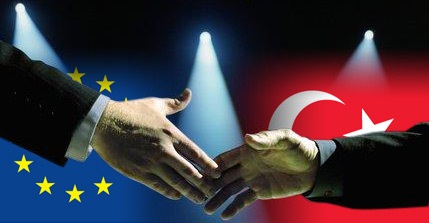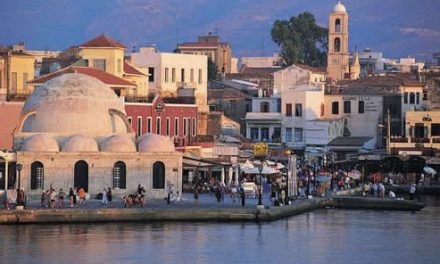by Ozay Mehmet, Social Europe
As a new year gets under way in a troubled world, it is timely to fix the ailing EU-Turkey relationship with a new Strategic Partnership. Much lip-service has been paid to Turkey’s “eventual full membership”, but neither Brussels nor Ankara really believes in it. Accession talks have been “frozen” for years.
With so many conflicting interests, and personality clashes between leaders, there is virtually no hope of accession on the horizon. Some right-wing voices in Europe are openly calling for a formal break in the talks. From a Turkish perspective, only one in three Turks, according to opinion polls, believe EU membership is a realistic target, however desirable it may be.
After hitting rock-bottom last summer over the Turkish Constitutional Referendum, now a thaw in relations may be underway. High-level German and Dutch contacts with Ankara have taken place and a more cordial dialogue for normalization may unfold. As a sign of goodwill, the German Chancellor Angela Merkel has promised Ankara she will expedite the still unpaid EU refugee funds of up to $6bn pledged to Turkey.
In politics, style and performance are critical. President Recep Tayyip Erdogan (RTE) has significantly toned down his anti-European rhetoric despite tensions during his recent visit to Paris. Turkey must be anchored in Europe, while closer identity of interests over new fields are emerging. One is Palestine and the Middle East where American isolationism is apparent. Another is energy security.
Fresh Fields Of Co-Operation?
With a post-Brexit EU facing secessionist risks in Catalonia and elsewhere, Turkey-EU relations are taking on fresh strategic importance. President Trump’s Jerusalem move, condemned by the Muslim nations and Europeans alike, provides the EU with an opportunity for a more active peace-making role supported by RTE.
In refugee management, Turkey is already a partner, but cementing this fragile agreement will be essential in future. Greek islands in the Aegean are already flooded with refugees. A hopeful sign is that, after the recent trip by RTE to Athens, Greek-Turkish relations may be on the mend.
In European energy security, Turkey is a vital actor in the Southern Gas Corridor. Caspian Basin gas will start flowing to Turkey through TANAP this year, and is expected to reach Europe via TANAP-TAP pipelines by 2020. Russian gas through the Turkish Stream 2 across the Black Sea is not far behind. Eastern Mediterranean sources are, likewise, most likely to pass through Turkey. As a result, Turkey-EU relations will acquire a new strategic character.
In trade, Europe is Turkey’s main market and it will remain so for the foreseeable future. The 1993 Custom-Union (CU) Agreement is seriously out of date and needs updating. But, in the present climate of mistrust, this is unlikely. Perhaps a deal with UK might provide a useful model for EU-Turkey future ties as well.
Turkey’s relative advantages are on a rising curve. Its labour force is, compared with Europe’s, youthful and dynamic. With rapid economic growth and rising real incomes, there will be fewer Turkish job-seekers flooding into European cities. A visa-free travel for Turkish citizen should be within reach.
All of these mutual interests, in addition to the NATO strategic alliance, point toward intensifying, not weakening, Turkish-EU relations. In the past decade or two, these relations have been more adversarial than friendly owing to a basic mistrust that has variously been described as “double-standard” or hypocritical treatment of Turkish accession hopes.
The Cyprus problem has been, arguably, the one area of the greatest hypocrisy in Turkish eyes. Promises and pledges to Turkish Cypriots by top EU officials have not been honoured. The Turkish Cypriot part of that unfortunate island remains isolated, highly dependent on aid and security via Ankara.
New Year, New Start
Now, at the start of a New Year, it may be the right time to redefine Turkey-EU relations on a brand-new footing of mutual trust and respect. That would pay huge dividends if only ‘honesty is the best policy’ were adopted.
What are the essential elements of a new Strategic Partnership? What would be its goal? It would be short of full membership but it would have sufficient substance to make Ankara go for it. Here are some key suggestions:
- Update the CU, specifically to remove Turkish irritations over unfair trade treatment with third countries. An integral part of this updating would be visa-free travel for Turkish citizens, already agreed to in principle.
- An Energy Partnership designating and promoting Turkey as a regional hub.
- A win-win refugee management agreement, providing for an agreed time-table of payments and periodic review updates, and
- An ad hoc mechanism to solve the Cyprus problem, perhaps within a larger Greek-Turkish cooperation agreement, specifically by accommodating a two-states settlement, both within the EU. The EU will have to work hard, closely with the UNSG to develop an incentive package acceptable to stakeholders.
This set, or something similar, would enhance Chancellor Merkel’s “privileged” relationship offer of 2010 which Ankara had rejected. Merkel’s offer was no more than an empty box. Now substantive incentives, custom-made in a post-Brexit world, and solid trust replacing the “double standard” approach of the past, might be just the medicine to fix ailing EU-Turkey relations.



















